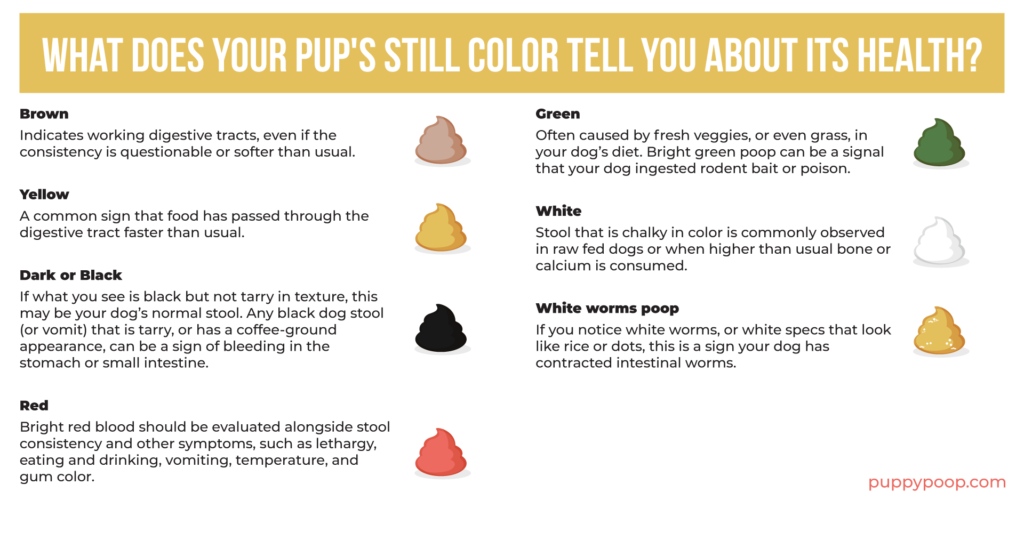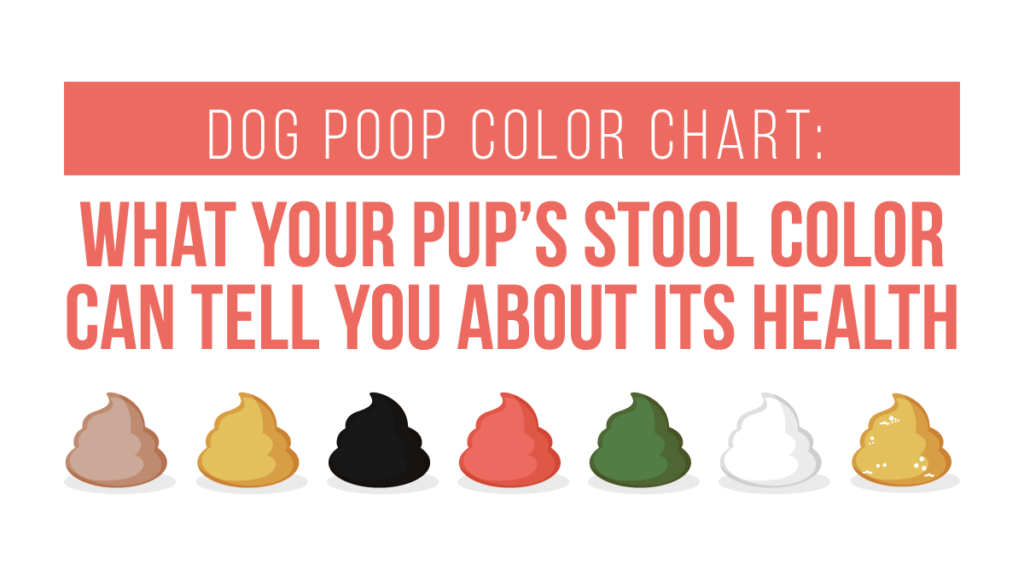Your dog can’t talk, but her poop color says a lot. As dog owners we are used to picking up the brown stuff, but have you ever bent down and had to do a double-take at the color? Dog poop color is a window into your dog’s digestive and general health. You can detect protein types and even speed of digestion from your dog’s poop color. Use our healthy dog poop chart to determine what your dog’s poop says about her health.
A healthy dog poop chart of colors will look like a “50 shades of brown” modern art painting. Plus, most changes in dog poop color are not an immediate cause for concern. What’s ‘normal’ varies by dog and even by day!
Dog poop with yellow mucus can be a signal that your dog’s a bit more stressed than usual or that her digestive system is adjusting to a new food or treat. Instead of panicking next time her stool’s color looks abnormal, reference the dog poop color chart below to understand why. The chart will help you decide when to keep monitoring or schedule a veterinarian check.

Brown Dog Poop
It’s no surprise that healthy dog poop is brown, but what may be of interest is why dog poop is brown. Like humans, dogs produce bile in their liver to help digest fats. As bile travels through the digestive system, it turns from a yellow-green color to brown, which is why stool is naturally brown in color. Brown dog poop indicates working digestive tracts, even if the consistency is questionable or softer than usual.
Yellow Dog Poop
Yellow dog poop is a common sign that food has passed through the digestive tract faster than usual. Yellow or orange dog poop may also coincide with diarrhea or even a slimy, jelly-like coating (this is mucus). There are a wide range of reasons this can happen. The introduction of new foods or treats, protein intolerance or sensitivity, or even a bit more stress than usual can all result in yellow stool. There’s no need to worry if your dog’s stool is yellow and she is otherwise healthy.
Yellow dog poop is also common for dogs who eat diets containing poultry or high corn content. If your dog eats chicken, turkey, or duck her stool will be more yellow in color. Beyond generally yellow dog poop, bimodal dog poop coloring (brown on the outside and yellow on the inside) is a normal result of eating poultry.
What about dog diarrhea that’s yellow and watery? We recommend monitoring loose dog poop with yellow mucus. You can try a short-term fast of 10-12 hours to rest and reset your dog’s digestive system. To reintroduce food, start with plain canned pumpkin and lean meat until stools are more normal. We recommend cooking 99% or 96% beef or other non-chicken protein as a bland diet for up to 2-4 days.
Dark or Black Dog Poop
Some dogs have very dark brown, almost black, colored stools, especially if they eat liver or other organ meats. Darker or black dog poop is also common when there is mild constipation or firmer, pellet-like stool consistency. If what you see is black but not tarry in texture, this may be your dog’s normal stool.
When is black dog poop a concern? Any black dog stool (or vomit) that is tarry, or has a coffee-ground appearance, can be a sign of bleeding in the stomach or small intestine. If you see this, you’ll want your dog examined by your veterinarian to understand the root cause. Dogs that are on anti-inflammatory medications, like NSAIDS, are at higher risk for ulceration or bleeding in the bowel. Although drugs like RIMADYL® and METACAM® are necessary at times, medications and drugs impact your dog’s digestive system so close stool monitoring is an important habit.
Red Dog Poop or Blood
As a caregiver, anything red can send off alarm bells even if only for a second. Before panicking, check the color of blood in dog stool for more insight into what’s going on. Notice bright red blood in your dog’s poop? Don’t immediately jump into crisis mode. Bright red blood should be evaluated alongside stool consistency and other symptoms, such as lethargy, eating and drinking, vomiting, temperature, and gum color.
Why is the shade of blood in dog stool important? During the digestive process one of the last steps is processing through the large intestine, which is where bright red blood (called hematochezia) originates. The brighter the red, the closer to the end of the digestive process the problem is occurring.
In contrast, dark red blood, referred to as melena, indicates digested blood and an issue with the small intestine. Check out our other article on blood in stool.
Green Dog Poop
Green dog poop, or a green hue, is often caused by fresh veggies, or even grass, in your dog’s diet. Other causes of green poop include artificial coloring in dog treats and the rare non-toxic crayon passing through.
Though not common, bright green poop can be a signal that your dog ingested rodent bait or poison. If you suspect this is a possibility or notice other symptoms, such as lethargy, weakness, or presence of blood, contact your veterinarian immediately. They will help determine the best next steps for getting your dog medical care.
White Dog Poop
White dog poop or stool that is chalky in color is commonly observed in raw fed dogs or when higher than usual bone or calcium is consumed. You may also notice white dog poop can often be hard and crumbly in consistency.
White Worms in Dog Poop
If you notice white worms, or white specs that look like rice or dots, this is a sign your dog has contracted intestinal worms. Tapeworms in dogs often look like pieces of rice in dog poop or around their rear end. Worms are very common and easy to treat. Bring the stool in a bag for your veterinarian to run a fecal test. If your dog is positive, she’ll begin a dewormer protocol (usually a dewormer chew or powder). Depending on the lifecycle of the worm and level of infection, it may take 2-3 rounds of dewormer to fully treat.
Tracking your dog’s normal stool color is an underrated hack for dog parents. Next time you encounter an off-color stool, remember the dog poop color chart. You can begin to decode what is happening with your dog’s digestive system and plan of action.
Get the DIG Labs App
Download the free DIG Labs Digestive Health Tracker to get personalized insights and recommendations for your dog based on their stool.

